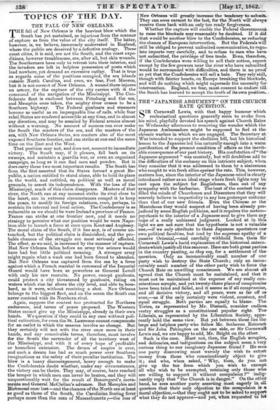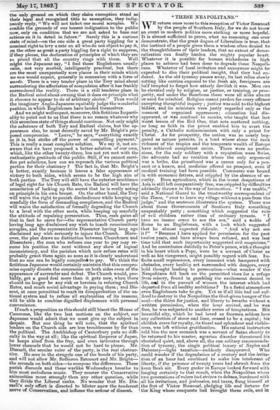THE "JAPANESE ARGUMENT" ON THE cfromm RATE QUESTION.
SIR Cornewel Lewis, with that happy humour• which. ecclesiasticalquestions generally seem to evoke from his mind, playfully devoted his speech against Church Rates on Wednesday afternoon to removing the wonder which the- Japanese Ambassadors might be supposed to feel at the- chronic warfare in which we are engaged. The Secretary at War intended to support the abolition bill, but his historical- lesson to the Japanese led him naturally enough into a warm justification• of the present condition of affairs as the inevit- able consequence of our past history. His confutation of " the- Japanese argument " was masterly, but will doubtless add to the difficulties of the embassy on this intricate subject, when. they consider that it was addressed to them by a statesman who sought to win fresh allies against the rate. This, however, matters less, since the interior of the Japanese mind is clearly introduced rather as an ideal stage where fresh lights may ber cast upon the subject for Englishmen, than out of any sympathy with the barbarian. The heat of the contest has so- filled the minds of Churchmen and Dissenters that they will scarcely believe in impartiality in any less grotesque costume than that of our new friends. Even the Chinese or the ' Mantchous they would suspect of having been already pre- judiced by some English politician, and it requires the metem- psychosis to the iuterior of a Japanese soul to give them any hope of a really unbiassed judgment. Looked at in this, light we are not sure that the hypothesis is not a valuable- one,—if we only attribute to these Japanese spectators our- own political faculties, but iced by the supreme apathy of a passive Ociental,—and carefully withhold from them Sir Cornwall Lewis's lucid explanation of the historical antece- dents which justifyall this rancour. Here are both great parties, in the country panting, as they say, for a settlement of the question. Only an. inconceivably small number of one party wish to- destroy the State Church ; only an incon- ceivably small number of the other party wish to force the Church Rate on unwilling consciences. We are almost all• agreed that the Church must be maintained, and that it must not be maintained at the expense of any really con- scientious scruple, and yet twenty-three plans of compromise have been tried and failed, and it seems as if all compromise., and all decisive victory, and all peace, were as far off as ever,—as if the only certainty were violent, constant, and equal struggle. Both parties are equally to blame. The: Tories, as represented by Mr. Disraeli, consider endless, vestry struggles as a constitutional popular right. The' Liberals, as represented by the Liberation Society, appa- rently hold the same view. But yet between these lies the large and helpless party who follow Mr. Sotheron Estcourt and Sir John Pakington on the one side, or Sir Cornewalt Lewis and, we are happy to add, Mr. Bright on the other. Such is the case. Must not, then, the English scruples, and delicacies, and indignation on the subject seem a very curious thing to our imaginary Japanese friend ? He sees one party disavowing most warmly the wish to extort money from those who conscientiously object to give it ; and who, when asked, " Why, then, do you not give up the tax from which you wish to exempt all who wish to be exempted, retaining only those who are willing to support it without compulsion ?" indig- nantly reply that "the Church is in danger." On the other hand, he sees another party asserting most eagerly in all quarters that their only objection to the compulsion is a moral objection,—that they ought not to be asked to support what they do not approve—and yet, when requested to let the only ground on which they claim exemption stand as their legal and recognized title to exemption, they indig- nantly reply, " We will not ticket our moral scruples. We confide the grounds of our honest indignation to the public now, only on condition that we are not asked to base our actions on it in detail in future." Surely this is a curious state of mind—on the one side a great party higgling for a nominal right to levy a rate on all who do not object to pay it, on the other as great a party higgling for a right to suppress, if they please, the declaration of principles of which they are so proud that all the country rings with them. Well might the Japanese say, "I find these Englishmen usually calm, • not very morbid, intelligently practical, but there are the most unexpectedly sore places in their minds which no one would expect, generally in connexion with a form of words. There is a very tender place in the Tory mind about surrendering the affectation of compulsion after it has frankly surrendered the reality. There is a still tenderer place in the Radical mind about owning that it does on principle what it chooses to appear to do of arbitrary choice." Thus would the imaginary Anglo-Japanese equitably judge the wonderful position in which Englishmen have landed themselves. And we might well expect, moreover, this fictitious Imparti- ality to point out to us that there is no reason whatever why this senseless state of things should continue. Not only might the substance of both Tory and Radical claims, but the ap- pearance also, be most decently saved by Mr. Bright's pro- posed compromise. "Leave," he says, "everything exactly as it is, but strike off the power of compelling payment." This is really a most complete solution. We say it, not un- aware that we have proposed a better solution of our own, which, like the other twenty-three, has not yet met with the enthusiastic gratitude of the public. Still, if we cannot sacri- fice pet solutions, bow can we reproach the various political intrties for their obstinacy ? The fact is, that Mr. Bright's is better, exactly because it leaves a false appearance of victory to both sides, which seems to be the high aim of both parties. The Tory will still have the exterior semblance of legal right for his Church Rate, the Radical will have the consolation of locking up the secret that he is really acting on principle in his own breast. On the other hand, the Tory will waive the right to punish disobedience while keeping up manfully the form of demanding compliance, and the Radical will waive the satisfaction of formally degrading the Church to a level with the other sects, while keeping up manfully the attitude of repulsing persecution. Thus, each gains all that in fact he cares for—the representative Church party having long ago disclaimed any wish to insult conscientious scruples, and the representative Dissenter having long ago disclaimed any wish seriously to injure the Church. More- over, the plan draws no distinction between Churchmen and Dissenters ; the man who refuses one year to pay may re- sume his position the next without any show of logical inconsistency, and the parishes which now refuse rates will probably grant them again so soon as it is clearly understood that no one can be legally compelleeto pay. We think the fictitious Japanese would certainly maintain that this compro- mise equally divests the concession on both sides even of the appearance of surrender and defeat. The Church would, pro- bably, get a good deal more than it gets now, when there should no longer be any risk or heroism in refusing Church Rates, and much social advantage in paying them ; and Dis- sent, at once permitted to mark its disapprobation of the na- tional system and to refuse all explanation of its reasons, will be able to combine dignified displeasure with personal convenience.
If such a proposition as this should still bisect the House of Commons, like the two last motions on the subject, our Japanese would admit that we must give up the subject in despair. But one thing he will note, that the spiritual leaders on the Church side are less troublesome by far than the political. The Archbishop of Canterbury puts no diffi- culty in the way at all ; like the spiritual Emperor of Japan, he keeps aloof from the fray, and even intimates through lower channels that he would not be hard to please. Mr. Disraeli, the secular ruler of the party, is the real obstruc- tive. He sees in the struggle one of the bonds of his party, and will not allow Mr. Sotheron Estcourt and Mr. Bright— the seconds on both sides—to compose the difference. These parish discords and these warlike Wednesdays breathe to him most melodious music. They muster the Conservative animosities more strongly than any other question, while they divide the Liberal ranks. No wonder that Mr. Dis- raeli's only effort is directed to blister anew the tenderest nerve of Conservatism, and inflame the ardour of dissent.































 Previous page
Previous page